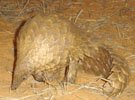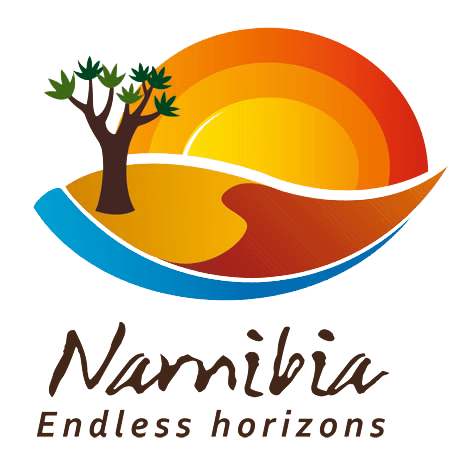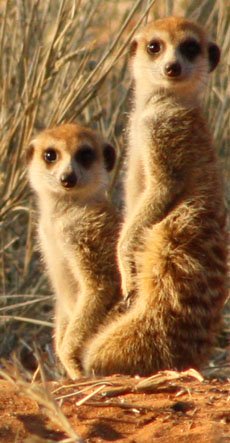For more information about our hunting safaris, don’t hesitate to reach out and contact us!
Like the Stillness of the Stars
by Stephan Hofmann
(Illinois, USA)
I slept through half the night in my thatch hut. At 0300 I awoke, took my flashlight and cigars, and went to the Boma in the center of the camp. The camp was powered by a generator and the camp was now dark. I placed fragrant, dense, and heavy Mopane wood on the coals of last night's fire. The fire soon blazed. I sat before the fire and warmed myself.
At 0330 the generators suddenly kicked in and the lights turned on. The Leopard hunters were up. Derrick the guide, and Angel, the Spanish cat hunter, came to the fire. They slurped their coffee and ate hard biscuit in preparation for their hunt on foot. Derrick remarked that there were five Leopard on the ranch; three males, and a female and a cub. He said they were using a pack of South African curs to chase the Leopards. Derrick loaded his pre "64" Model 70 Winchester .375 H&H with shells, and he and Angel slipped into the night.
The generator clicked off. I was left alone in the firelight. I lit up an Indian Tabac Madura Tomahawk Cigar and gazed into the fire. The Stephen Stills song, Southern Cross, played in my head. I looked up and saw the Southern Cross Constellation among the myriad of stars.
I smoked my cigar, looked at the stars, and thought, "My God, I am in Africa. I am all alone and about to start a shooting safari." I asked myself, "Would I be worthy? Would I be up to the task?"
Everything was new to me. My Professional Hunter would have to be my guide. I was an innocent in a Savage Land. There were Leopards and Lions on the ranch. For all I knew one could be stalking me now. I continued to gaze into the fire and the stars and thought of what an achievement this was for me in my life.
I was halfway around the world about to hunt a variety of wild African animals!!
The Crosby, Stills, and Nash song continued to go through my mind. I smoked my Nicaraguan cigar, warmed myself before the fire, listened to the Black-Backed Jackals howl, and drank African Coffee.
At 0600 the generators kicked in and the camp awoke. Barry was to be my PH. Yassir, would be my Herero tracker and driver. I gave Yassir a cigar. This would be my practice throughout the hunt. He rolled his own cigarettes out of newspaper and tobacco. I thought he deserved a good cigar. We had fresh eggs and bacon for breakfast compliments of Miriam. We headed out into the bush.
Barry wanted to hunt next to a waterhole the first day. Another hunter had shot a nice Kudu Bull at this waterhole the day before. Yassir dropped us off about one half mile from the waterhole. We walked over the extremely rocky ground and saw much Gemsbok and Zebra sign.
I was fascinated and ever alert on the walk to the waterhole. It was my first time on African hunting soil.
We approached the waterhole and placed ourselves in a blind of fresh cut vegetation. Immediately, hundreds of Social Weaver Birds began to alight on the watering trough. We heard the call of the Go Away Bird. I thought he was talking to me. We saw many Yellow Billed Hornbills. We heard the call of the Hoopoe Bird.
All of a sudden a dark presence alighted on the waterhole. A large Black Martial Eagle had come to drink. The other birds left with the coming of the Martial Eagle. The Martial Eagle departed and a large Kori Bustard came to drink. The Kori Bustard is the worlds largest flighted bird.
You may assume that Namibia is a dry lifeless land, especially for birds. To the contrary; there is tremendous avian life in Namibia, thanks possibly to the waterholes set up by hunting ranches.
Hordes of Sand Grouse and Guinea Fowl drank at the watering hole. I saw a Pale Chanting Goshawk approach the Sand Grouse. The Goshawk flew at the Sand Grouse, then veered toward me in the blind. The Goshawk flew right to the entrance to the blind; I could have touched it; then it flew off. It was very exciting!!
It was now about 0900. Suddenly, in the brush in back of the water hole a female Kudu materialized. She came out of no where. I got really excited and placed my scope on her to simulate a shot. The Kudu got jumpy and ran away. She had sensed my movement.
Barry whispered to me that the females come first then the bulls. I was to remain still until a shot at a bull presented itself. Barry said that he realized how excited I was. I was a new kid on the block and appreciated his advice. From now on I would remain still.
We waited another hour. I could hear the sound of the water pump in back of the blind. I could hear Barry sharpening his knife in back of me. All was still. Suddenly I saw three Kudu cows and two yearlings approach the water hole. I saw the flash of a horn. A young bull followed the cows.
They moved ever so slowly, one step at a time, in perfect silence. I never saw such careful and silent movement by animals. The bull had about a one and a half curled horn; not a shooter. I remained perfectly silent. We watched the Kudu for about one half hour as they approached the water. They were so nervous and cautious that they did not drink. I remained silent and motionless the whole time. They eventually sensed our presence, barked, and ran off.
I had experienced a wonderful time in the African bush. Barry congratulated me on remaining perfectly still.
It was now about 1100. We continued to wait by the water hole. After awhile Barry quit sharpening his knife and said, "Gemsbok".
I looked to my left and saw a beautifully colored animal. Barry whispered that the Gemsbok was a small one and we could do better. He was not a shooter. I was terribly excited. The Gemsbok approached the water and began to drink. After a while it left the water hole. It was now about 1200. Barry and I went back to camp for lunch.
We had a substantial meal of Gemsbok Bolognese for lunch compliments of Miriam.
Afterwards we rested for a few hours in the mid day heat.
That evening, Barry's beautiful wife Lizelle would accompany us on our hunt for good luck.
We went to a large water hole next to an abandoned homestead. The homestead had large windows to shoot through. We would be in the homestead and ambush any animal that presented itself.
There were scores of Sand grouse and Guinea Fowl drinking the water. We saw a diminutive Duiker approach the water. We also saw a trophy Steenbok next to the water. I had traded the Duiker and Steenbok in my package for an additional Kalahari Springbok. They were good shooters however.
At about 5 PM a large troop of Baboons came to the water hole. They were big, black, and evil looking with long arms swinging as they walked. Lizelle said that ,"Now that the Baboons had spotted us, it was no good to await any more animals". She was wrong.
We heard the barking of Kudu. A large herd of thirteen female and young Kudu came to the water. They were immediately followed by seventeen young bull Kudu. What an immense herd!! Unfortunately there were no shooters in the male herd. I stayed perfectly still. We watched them for a while, then they dispersed.
It was getting dark. We left the water hole. On the way back to camp Barry and Lizelle stopped to look at their Email. We stopped at a high spot. They took a chip out of their cell phone and placed it in their Email device. While they were reading their Email I looked into the sky and saw the Southern Cross.
I again asked the firmament if I was worthy of this land... this country... this continent called Africa.
Would I be as worthy as those who have tread here before me?
John Hanning Speke and Richard Burton who may have discovered Lake Victoria as the source of the Nile River....
William John Burchell, the great English explorer, naturalist, author, and artist who described Southern Africa in the early 1800's and has many species of animals and plants named by and after him...
Theodore Roosevelt, American President who used his Big Medicine .405 Winchester lever gun to harvest over 2000 African animals for museums in the USA....
Ernest Hemingway, American author whose novels "The Green Hills of Africa" and "The Snows of Kilamanjaro" are the quintessential African Literary offerings......
John Pondoro Taylor, whose extensive knowlege of Elephant anatomy allowed him the use lesser calibers in his career as an Ivory hunter...
Peter Hathaway Capstick, was a great African hunter and writer who brought the Dark Continent and Death in the Long Grass to the forefront in the modern world.....
Craig Boddington and Steve Hornady, Modern hunters who pioneered the .375 Ruger cartridge on all manner of African Game......
Terry Blauwkamp who has been to Africa twenty times and lends his expertise to blogs, emails, and websites......
The stillness of the stars offered no answer to my query. I had not been worthy yet but prayed that I would be in the future.
Stephan Hofmann
Comments for Like the Stillness of the Stars
|
||
|
||
|
||
|
||
|
||
Meaning of "Uitspan"
'Uitspan' is an Afrikaans word that means place of rest.
When the Boer settlers moved inland in Southern Africa in the 1800's, they used ox carts. When they found a spot with game, water and green grass, they arranged their ox carts into a circular laager for protection against wild animals and stopped for a rest.
They referred to such an action of relaxation for man and beast, as Uitspan.
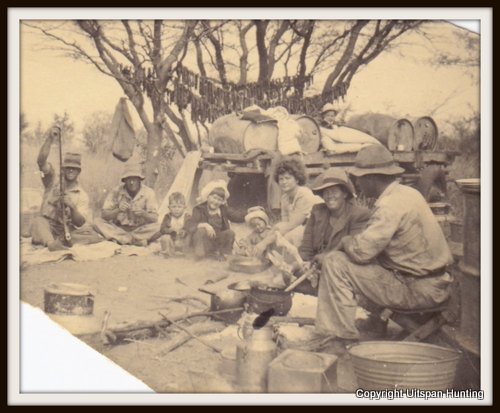
(Picture above of our ancestors.)
Did you know?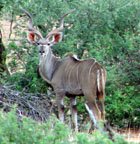 Greater Southern Kudus are famous for their ability to jump high fences. A 2 m (6.56 ft) fence is easily jumped while a 3 m (9.84 ft) high fence is jumped spontaneously. These strong jumpers are known to jump up to 3.5 m (11.48 ft) under stress. |
Did you know? Some animals have one sense more than man!The flehmen response is a particular type of curling of the upper lip in ungulates, felids and many other mammals. This action facilitates the transfer of pheromones and other scents into the vomeronasal organ, also called the Jacobson's Organ. Some animals have one sense more than man!The flehmen response is a particular type of curling of the upper lip in ungulates, felids and many other mammals. This action facilitates the transfer of pheromones and other scents into the vomeronasal organ, also called the Jacobson's Organ.This behavior allows animals to detect scents (for example from urine) of other members of their species or clues to the presence of prey. Flehming allows the animals to determine several factors, including the presence or absence of estrus, the physiological state of the animal, and how long ago the animal passed by. This particular response is recognizable in males when smelling the urine of a females in heat. |


